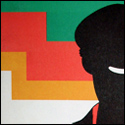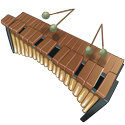|
Chroisman posted:So I previously asked a question about studio headphones, requiring flat response and minimal sound bleed for acoustic and vocal recording. In this thread and another, people were happy to recommend the Beyerdynamic DT770s, which I really appreciate. I can't compare them to the DT770s (not enough experience with em) but I LOVE my DT250-80s. I've had one pair for 7 years and enjoyed it so much I bought another, even though my old pair is still going strong. Before getting into sound quality comparisons, I've spent a lot of time with various AKGs and Sennheisers, and the Beyers are the only ones I am happy to wear for long, long periods. They don't have that vinyl stuff pressing up on my head, they don't make my ears too hot, and they cup around my ears perfectly without being awkward. Comfort is super subjective, I know, but they're perfect for me. I like the curly telephone cord too. Sound quality-wise, I find them well-balanced and detailed, if slightly on the dark side. Before I bought my second pair, I tried A/B comparisons with some comparable Sennheisers and felt like the Beyers had a more "depth," a more immersive/lifelike representation of things, a crispness that wasn't unnaturally crisp, just detailed. Others will probably give you a better or more prominent bass response, but I've never found it lacking for my purposes. They have the typical pros/cons of closed-back phones, which I'm sure you've researched. Great for tracking due to low bleed but equally due to their comfort during long sessions.
|
|
|
|

|
| # ? May 10, 2024 10:34 |
|
DT250s are not recommended if your head is as big as mine, just want to throw that out there. My US hatsize is 8 and I'm still trying to find something better than my duct-taped Sennheiser HD25s that fits.
|
|
|
|
I'm working on a remix of a 90's hip-hop track ("Smooth" by Tha Dogg Pound, for the curious), and because I can't for the life of me find an acapella version of the song, I'm trying to simply EQ out as many extraneous elements as possible. What I'm trying to do in particular is minimize the snare as much as possible, yet despite my best efforts, I absolutely cannot find a way to do this without inadvertently bringing down the vocals as well. Does anyone have any ideas as to how I might go about doing this?
Brock Velocity fucked around with this message at 07:53 on Dec 27, 2012 |
|
|
|
A while ago I bought my first steel string acoustic (LTD XTone) and i'm needing to change the strings. I'm not able to pull the bridge pins out by hand and I keep being told to not use any sort of metal tool to pull them as they might damage the pin in the process. Can someone point me in the direction of a "safe" tool to use?
|
|
|
|
That Guy From Pearldiver posted:A while ago I bought my first steel string acoustic (LTD XTone) and i'm needing to change the strings. I'm not able to pull the bridge pins out by hand and I keep being told to not use any sort of metal tool to pull them as they might damage the pin in the process. Get something like this: http://www.musiciansfriend.com/accessories/dunlop-gel-string-winder It will make your life a million times easier. With a string winder, I don't even mind changing the strings on my 12-string! (much)
|
|
|
|
That Guy From Pearldiver posted:A while ago I bought my first steel string acoustic (LTD XTone) and i'm needing to change the strings. I'm not able to pull the bridge pins out by hand and I keep being told to not use any sort of metal tool to pull them as they might damage the pin in the process. Put the tip of a towel over the pin, gently ease out with some blunt-nosed pliers; e.g. the angled ones for electronics - virtually impossible to exert too much pressure with those.
|
|
|
|
That Guy From Pearldiver posted:A while ago I bought my first steel string acoustic (LTD XTone) and i'm needing to change the strings. I'm not able to pull the bridge pins out by hand and I keep being told to not use any sort of metal tool to pull them as they might damage the pin in the process. I've never had problems using coins (one on each side to lever it up) but I tend to be an outlier in life. If you go the coin route, use the smallest and thinnest ones you can find.
|
|
|
|
The way I was taught to string change an acoustic was to loosen all the strings and use the rounded side of a spoon to push the pins out from the inside of the guitar. Then again, I've never really had anything but inexpensive acoustics, so I don't know if that is the best method.
|
|
|
|
Most string-winders have a slot in the winding part to pull the pins out. If you don't have a string-winder, get one. Also, does it drive anyone else crazy seeing guitars with tons of excess string sticking out of the tuners. Some people don't even bother to wrap them up into circles and they just kind of stick out every which way. Wire cutters are cheap!
|
|
|
|
I always kept those extra string bits on there on my electric guitar, because I like to hit them and make dissonant noises with high gain
|
|
|
|
What would Jazz/Blues guitar strings sound like heavily distorted and played with a bow?
|
|
|
|
Sorbo Shirtless posted:What would Jazz/Blues guitar strings sound like heavily distorted and played with a bow? https://www.youtube.com/watch?v=AIHabvURnpk "Jazz strings" are often flatwound, which are a heavier gauge, and have a darker/mellower sound. I don't know how much of a difference that would make with a bow. "Blues strings" could be anything really, that's not really a useful description.
|
|
|
|
h_double posted:https://www.youtube.com/watch?v=AIHabvURnpk They're the ones that your woman took when you woke up this morning.
|
|
|
|
Excavation posted:They're the ones that your woman took when you woke up this morning. They're the ones in your suitcase at the deserted station.
|
|
|
|
I've got this Alesis stereo EQ, does it matter what channel I use if I'm just using it mono?
|
|
|
|
I've been spending too much time F5ing Craiglist to find a decent deal on one of several models of used synthesizer I'm shopping for. Is www.list-alert.com reputable or no? That or any other way I can set up a search which will just alert me as things are added to certain cities' Craigslists?
|
|
|
|
TapTheForwardAssist posted:I've been spending too much time F5ing Craiglist to find a decent deal on one of several models of used synthesizer I'm shopping for. Is www.list-alert.com reputable or no? That or any other way I can set up a search which will just alert me as things are added to certain cities' Craigslists? Plus, I prefer browsing Craigslist that way because it's easier to scan through a bunch of pictures instead of line after line of text listings that may or may not be descriptive.
|
|
|
|
heap posted:Plus, I prefer browsing Craigslist that way because it's easier to scan through a bunch of pictures instead of line after line of text listings that may or may not be descriptive. This, and some apps let you search multiple cities simultaneously. Best feature ever.
|
|
|
|
I am a thoughtful husband. My wife played viola quite well in high school, but barely plays anymore (because viola arrangements  ) )She's expressed interest in learning cello, as it's a more interesting solo instrument with a lot of great music out there. I'd like to surprise her for our anniversary with an instrument rental/book or something. What's the best way for an adult with stringed instrument experience to learn cello? I'm looking around town (Phoenix area) trying to price some rentals, and I'm guessing that the scaled-down student cellos made for 12 year olds would be lousy to play for a 6 foot tall woman. Does anyone know of a good book or manual designed to teach adults with orchestra experience how to play cello? Or maybe I should just get her a book of good solo sheet music arrangements for viola. I have no idea.
|
|
|
|
A cello is a different enough instrument that even with viola experience, it'd be a good idea for a new player to have at least a few in-person lessons to learn basic technique (how to hold the intrument, proper bow technique, etc.); things that'd be difficult to explain perfectly with a book, but that an experienced player would easily be able to give immediate feedback. Try checking google/craigslist/etc. for adult instructors in your area; you should be able to find some who will either come to your home or give lessons at a studio. That person should also be able to provide better information about instrument rental, compared to just walking into a random music store.
|
|
|
|
I'm looking for sample pack recommendations. Some things I'd like to know are, what are the popular packs being used right now? Which are the "must haves"? Especially since it can be hard to know if a pack is good before you drop $80 on it, I'd like to hear from people who own one or a few.
|
|
|
|
SynthesizerKaiser posted:I'm looking for sample pack recommendations. Some things I'd like to know are, what are the popular packs being used right now? Which are the "must haves"? Especially since it can be hard to know if a pack is good before you drop $80 on it, I'd like to hear from people who own one or a few. What sort of music are you doing, and what sorts of instruments do you need?
|
|
|
|
Trig Discipline posted:What sort of music are you doing, and what sorts of instruments do you need? I mainly do house, electro, trance, that kind of music. I'll try dubstep and other genres at some point I'm sure. Right now my main concern is drums and percussion loops. SynthesizerKaiser fucked around with this message at 22:04 on Jan 4, 2013 |
|
|
|
Ah, I'm afraid I don't know jack poo poo about that sort of thing. Sorry.
|
|
|
|
SynthesizerKaiser posted:I mainly do house, electro, trance, that kind of music. I'll try dubstep and other genres at some point I'm sure. Right now my main concern is drums and percussion loops. Try in the bleepy bloop thread, you'll probably get the best recommendations there http://forums.somethingawful.com/showthread.php?threadid=2791601
|
|
|
|
This is kind of a broad question, but I love Reggae and Electro music, so I've been trying to do some sort of mash-ups. I've been listening to this on repeat. https://www.youtube.com/watch?v=PR_u9rvFKzE Here's the big problem. I have no idea how to *make music.* I have Ableton, a ton of NI Plugins, I can make anything I want, but I still can't find answers to simple things. Like, for instance, on Daft Punk's "Around the World," the bassline is all funky and awesome. How did they do that? I mean, did they just throw notes together until something sounded good? There has to be some sort of science to it! I keep reading my book on music theory, but it doesn't seem to answer my questions. The biggest one, "how do you put notes together to make something sound natural and funky and cool." Because I am obviously not doing it right! My music-making process so far: 1. Build some sort of drum loop 2. Make a string-bass loop by randomly placing notes and moving them around until they sound kinda neat. 3. Put on some music for inspiration, realize that I'm obviously missing something and take a break. 4. Repeat. Please, please help, before I go insane.
|
|
|
|
Radical Griff posted:Like, for instance, on Daft Punk's "Around the World," the bassline is all funky and awesome. How did they do that? I mean, did they just throw notes together until something sounded good? There has to be some sort of science to it! I keep reading my book on music theory, but it doesn't seem to answer my questions. The biggest one, "how do you put notes together to make something sound natural and funky and cool." Because I am obviously not doing it right! You're on the right track with music theory. For developing good melody progressions, it helps to understand intervals, scales, and chords. These things are all interrelated and all build upon one another. An interval is simply the distance (in semitones) between two notes -- a minor third can sound mellow or pensive, a major third can be bright or stately, and soforth. Scales are built upon a particular pattern of notes of the full 12-note chromatic scale, and chords are built from a particular set of notes within a scale. A good place to start with this is ear training. There are a number of apps and websites to help you with this (musictheory.net and http://trainer.thetamusic.com/ are great theory resources), which will play one note and then another and you have to identify the interval between them. This will help you learn to instinctively recognize a minor third or a major seventh or an octave interval when you hear one, and this will help you be able to decode other people's melodies when you hear them. Another thing that has helped me a lot is practicing tons and tons of scales. Guitar is my main instrument, I really like the way that scale patterns are laid out on the fretboard, plus it's easy to move around from key to key (this is all true of bass guitar too of course). Keyboard instruments are great for being able to visualize patterns too. Practicing scales is partly training for performance, but it's also a form of ear training and drilling in pattern recognition -- it helps you internalize the roadmap of intervals within a scale. The minor and major scales are the most common, and the pentatonic minor scale is extremely common in all types of pop music. From scales you can go to chords by playing arpeggios -- that is, picking out just the chord tones (typically the first, third, fifth, and seventh notes) of a scale, and playing those back and forth in different patterns. You can whip up some great basslines and melodies by starting with a basic arpeggio, tweaking notes around a bit, changing up the order of the notes (inversion), etc. I realize I'm throwing a lot of terms at you here, naturally don't worry about trying to digest everything at once. Be patient! Once you've got a decent grasp on music theory, that's one piece of the puzzle. Another is a strong sense of rhythm and groove, this is something else which takes lots of practice for most people. You can start by using a metronome (or click track in your DAW) when you're practicing scales, and start with the tempo turned down S-L-O-W, and don't turn it up until your timing is tighter than a nun's butthole. Then, learn about swing and syncopation. And if you want to play or produce reggae or house or funk (or whatever), learn about the particular patterns and rhythmic stresses that characterize that type of music (for example, most rock/blues has the emphasis on the downbeat -- ONE two THREE four -- while reggae emphasizes the upbeat -- one TWO three FOUR). I guess some people naturally have a good ear for complex rhythms and can program them directly, but in my experience it helps a lot having at least some basic skill with a performance instrument, to help "feel" the rhythm and strengthen the connection between the mental and the physical. Once you get all this down, you have the makings of a badass bassline. Now you just need to learn about synth programming, about oscillators and filters and envelopes and LFOs, about the general physics of sound, about EQ and compression and mixing and how to make sounds sit together tightly with one another. And by now you're probably ready to go back for more music theory, to learn how to take all those individual snippets of melody and rhythm and tone, and add in bigger building blocks of chord progression and harmonic theory to turn it all into a fully realized song. And again, this is a lot of stuff to take in, but you don't have to digest it all at once; it takes most people years to sound "merely okay" if they are trying to write and produce entire tracks from scratch. But hopefully this wall of text can provide at least a helpful overview of what goes where. The great part of computer production is you don't have to figure everything out at once. Maybe you want to start with a sampled drum loop and some killer synth presets and a melody not much more complex than "Mary Had a Little Lamb", but you want to make that melody really groove. Or maybe you want to jack the melody from a song you like and program a synth tone to make it sound like something totally different. Be diligent but have fun with it! h_double fucked around with this message at 09:52 on Jan 5, 2013 |
|
|
|
As well as that, it would really help if you had an instrument to play - even if it's just hitting a bottle with a pen or something, or drumming your fingers. Composing on paper (or sequencing stuff) really requires an understanding of what you're trying to do and the way to phrase that timing, and it'll involve a lot of trial and error. You'll probably have to look at 'humanising' your stuff too, knocking the rigid timing off slightly so you get a more natural feel. And really, you'll learn a lot just from listening to good funk basslines, and trying to copy them. A lot of great ones are melodically very simple, just roots, 5ths and minor 7ths, but the timing is what makes them groove. Listen to how they play around the beat, when the notes fall on the beat and when they don't, when there's space and when there isn't (and this is where music theory will help, since you're formally sequencing the rhythm instead of just playing it by feel) https://www.youtube.com/watch?v=IHE6hZU72A4 Actually this whole (80s as gently caress) series might help, it's pretty good https://www.youtube.com/watch?v=1-hwapgKmHc
|
|
|
|
Thanks so much!  Is there a thread where we post our favorite songs and have people smarter than I analyze them from a musician's perspective, how they work and come together and whatnot? I've always wanted one!
|
|
|
|
Radical, do you have a keyboard? If you want to make your own music, you could probably get to that point way faster by learning other people's in parallel. That way, you can figure out why songs work the way they do. You can probably get a really cheap midi controller (keyboard that controls your software) on Craigslist to mess around on and learn about chords and scales and stuff. It'll also help so you don't have to click and drag notes around all the time once you get better. I don't know a good online resource for piano, but I'm sure if you dig around for things like "beginning piano theory" and "easy songs for piano" you'll be able to find something that makes sense, and then branch out from there. Edit: If you do decide to play piano, a bunch of people will tell you the ONLY WAY is to get a teacher and learn classical technique. This is fine if you want to play concerts or classical pieces, but it sounds to me like you really want to write songs, so you don't need perfect technique. You could still get a teacher, but make sure they know you want to learn about theory and contemporary composition The Mystery Date fucked around with this message at 19:57 on Jan 6, 2013 |
|
|
|
What is everyones opinion of tuning apps vs inexpensive tuners? I have several of the popular apps on my G2 and they work perfect for string instruments but are really struggling with a xylophone we are building. Its really hard to get the same reading, the tuners are all over the place, jumping octaves even. Not sure if its us, the apps, or the limits of the phone.
|
|
|
|
Buy a Snark tuner never look back.
|
|
|
|
Buy a _red_ Snark tuner, never look back.
|
|
|
|
Thumposaurus posted:Buy a Snark tuner never look back. I looked at the red one, seems right.
|
|
|
|
Radical Griff posted:Thanks so much! Don't think so, and honestly this forum loses threads so quickly it would probably all get lost at some point. There are some websites that deal with it though, this was kinda cool but it seemed to burn out: http://blog.fixyourmix.com/category/music/compositional-analysis/ But search for compositional analysis or deconstruction and the name of a song - like I found this (which I'm watching now, so maybe I won't have to do the bassline breakdown like I was going to): http://www.pointblankonline.net/blog/electronic-music-composition-pt-5-daft-punk-around-the-world-the-bassline/ Ok I don't totally agree with everything he's doing (plus I think it makes more sense to think of the song being in A minor), and he's missing some bits out (like the G G# A walkup at the end of the main bass riff), but it's mostly helpful. I'll try and say a bit about how it actually works. So ignoring the intro (which is just the end of the main riff looped a few times), you get this pulsing bassline that falls on the beat. It starts on A, then the next bar is C, then the next is E. So you can play, four beats to the bar: A A A A C C C C E E E E Then you get a descending part that walks down through the scale, at double the speed using 8th notes: F# E D C B A G G# A It actually jumps up a step to F# first, then runs down the scale a little past the target A note to G, before walking back up chromatically and straight back into that pulsing A at the start of the riff. So to recap, the basic idea is slow rhythmic pumping on the root note of each implied chord, which involves moving up the scale, and then for the second part it quickly runs back down the scale. The video is actually based around dancers representing what each instrument is doing, so you can see this with the tall guys acting like the bass. If you've actually sequenced what I've described and listened to it, you'll have noticed I kinda lied about the rhythm. This is where the funkiness comes in - there's a skippiness here and there that adds energy and tension, and actually makes the song danceable. The drums are really just going kick hat snare hat in a straight 4/4 rhythm, so the bass is what's making the funk happen. A--- A--- A--- A-BC|---- C--- C--- C-DE|---- E--- E--- E---|F#F#E- D-C- B-A- G-G#A|---- A---... So two things are going on here - the bass is actually walking up to the next note (like hitting the B going from A to C) which gives a feeling of movement, and it's actually hitting the next note in the progression slightly early (a 16th note early, to be precise), leaving that gap before the second note in the bar. So there's a kind of push and pull going on with that rhythmic pulse. If you put that riff into your sequencer (each - is a 16th note), and then try it with that early note pushed forward onto the first beat of the next bar, you'll hear the difference it makes. You can try leaving it all as A notes too, just to hear how much of the sound is about that rhythm and not the melody. The other thing to look at is the staccato feel of the notes - the pulsing notes are cut short instead of being allowed to hang there, which gives it a much more punchy, rhythmic feel. But the note on the 4th beat feels like it's allowed to sustain, giving a moment of momentum just before that fast walk up and the early pulsing note. Sort of like: ba. ba. ba. baaaabada! ba. ba. baaaabada! Like I said, it would honestly help to have an instrument to play with - it was way easier for me to learn the rhythm on the bass, than it was to work out how the notes divide up and actually analyse what was going on. If you're actually writing your own lines, and you don't have a really good grasp of how to translate ideas into notation, you'll probably have a lot more fun messing around on an instrument and working out what sounds cool, then finding out how to translate that into sequencer talk. Hell if you have a MIDI instrument it'll do it for you! e: yikes that's long
|
|
|
|
Okay, so there's a really simple thing I'm trying to do in Ableton, but I can't figure it out. It's a stutter-type effect, but let me explain exactly what I'm looking for. I have a full song that I've warped and quantized. It's in, say, 4/4 at 120bpm. What I want to do is transform it based on the quantization to match a different signature, a swing or something, and then--this is the part I'm scratching my head at--have the track muted for a brief, predetermined determined period of time before every, say, quarter note. This seems like a two-step process, but I have trouble with both steps. When I attempt to apply one of Ableton's grooves to the track, I can never really hear the difference. Regarding the muting, I just have no idea how to do that, even though I have a pretty concrete understanding of *what* I'd be doing. Does that make sense?
|
|
|
|
I'm having the weirdest guitar problem. I have 2 cables that when connected directly from my guitar the the amp work fine, however when i put a pedal between my guitar and amp, I get no sound, even when the pedal isn't on. I have two pedals, both with which I have tried this, and both which have brand new batteries (changed today). I also have one of those little cables that are used to connect pedals together, and if I connect that little cable between the guitar and a pedal and connect the pedal to the amp with one of the other cables, I get sound when the pedal is pressed on but no sound otherwise. I have tried this on two different amps.
|
|
|
|
Some pedals and amps can be picky about receiving a mono or stereo signal, is perhaps one of the long cables stereo while the others are mono? Alternately do both long cables work straight from guitar to amp?
|
|
|
|
Both of the long cables are the same cable. Not sure if they're mono or stereo. They also both individually work.
|
|
|
|

|
| # ? May 10, 2024 10:34 |
|
Is there a cheap, diy alternative to proper acoustic foam?
|
|
|



























